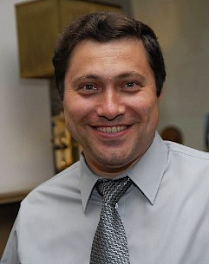We love to celebrate some traditional American holidays in our own "Russian" way. Thanksgiving Day? You can see signs all over Russian stores like "Discounted Turkeys" ("Deshoviye Turky", to be exact). Labor Da
 y weekend? Everybody is on vacation.
y weekend? Everybody is on vacation.Independence Day? There are plenty of events with freshman citizens carrying the Stars and Stripes, and embracing the popular slogan, "God bless America!" and listening to patriotic songs on TV and radio.
Instead of celebrating Mother's Day and Father's Day (don't get me wrong - some people do celebrate them), our community prefers to stick with February 23 and March 8. The first one is celebrated as Men's Day, while the second one is praised as International Women 's Day.
In reality, February 23 is an official holiday in the Russian Federation - Russian Army Day. This Communist holiday was established by Lenin and his Bolshevik colleagues in 1918 to boost morale of the Red Army soldiers. The point is quite simple: this day has nothing to do with the Victory over Nazis in 1945. Still, every year on February 23, here in the U.S. Russian TV and Radio stations, newspapers editorials and members of war veterans families celebrate this "Great Holiday". Many women in our community use this occasion to congratulate their men because that was customary in the Soviet Union. Personally, I refuse to celebrate this Communist holiday because it has nothing to do with the USA, nor the Victory over Nazis nor fatherhood. Unfortunately, the Russian embassy in D.C. and the Russian Consulate in New York always try to manipulate elderly Russian-speaking veterans into celebrating this occasion.
Next comes March 8 - International Woman's Day. It's not celebrated in the U.S., and it also has some kind of Communist/feminist history. But, at least, March 8 was not invented by Lenin, Stalin or Brezhnev and was not associated with the Red Army. On this day, women in the Russian-speaking community are used to receiving flowers, perfume, and other gifts. Usually on March 8, I congratulate my wife, my mother-in-law, my sister, my female co-workers, but not my American-born friends.
May 9 is also a sacred day for all Russian-speaking immigrants. On that day in 1945, the Soviet Union officially declared "Final Victory" over the Nazis. That is why we celebrate this holiday as the most important day of the year. It's a special holiday for Holocaust survivors, World War II veterans and people who barely escaped the Nazi occupation (like my mother-in-law). We usually don't celebrate similar American holidays like Veteran's Day, Memorial Day or even D-Day (when anti-Hitler allies landed on Nazi-occupied Normandy in 1944.)
Moreover, in recent years Russian diplomat
 s started actively engaging Russian-speaking seniors on May 9, attempting to promote Russian patriotism, by playing nostalgic themes. I don't like these KGB spies hanging around Brighton Beach.
s started actively engaging Russian-speaking seniors on May 9, attempting to promote Russian patriotism, by playing nostalgic themes. I don't like these KGB spies hanging around Brighton Beach.Unfortunately, our veterans feel comfortable inside the Russian Consulate...
Finally, we celebrate New Year and Yom Kippur. On New Year, Russian immigrants must put on the dinner table the classic Russian salad " Olivye" (mix of green peas, carrots, potatoes,eggs,bologna and mayonnaise) and a Champagne bottle. On Yom Kippur, Russian Jews usually show up at their local synagogue (often for the first and last time in a year) and donate $100 in memory of their deceased parents.
We are all still struggling to answer the same question about our identity: who we are? Russians? Jews? Americans? Religious or atheists? The proper answer would be the unusual mix of everything. We like Russian culture, but at the same time we feel passionately towards Israel and our Jewish roots. We celebrate Hanukkah, Passover, Yom Kippur and Purim while ignoring kosher, Shabbos and prayers. Where else can you see Hanukkah Menorah and Christmas tree at the same time? We try to adapt to American traditions and we love to say "God bless America!", but we still enjoy watching most of the programs of the Channel I, which is nothing more than direct rebroadcasting of the state-controlled channel from Moscow.
The Russians are here... and over there as well...
P.S. I forgot to mention that younger Russians also embrace Halloween while older people like to celebrate Valentine's Day.

No comments:
Post a Comment